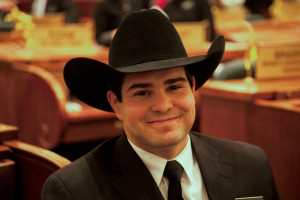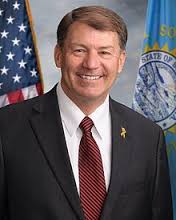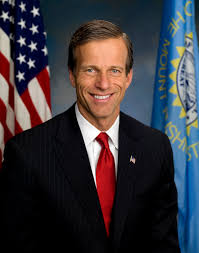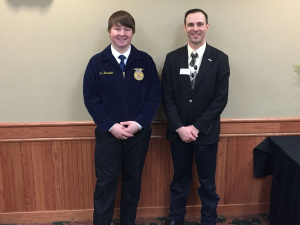
Richard Tate, age 86 of Hidden Timber, passed away on Saturday, Jan. 28, 2017 at North Platte Care Center.
He was born to Jay and Eva (Rothley) Tate in a tarpaper shack on their farm west of Hidden Timber on Jan. 6, 1931. Richard spent his entire life on this land.
Richard attended Schneiderite School through elementary then Todd County High School, where he graduated in 1949. Following graduation, he attended South Dakota State College in Brookings.
He was drafted into the US Army on June 17, 1952. He spent two Christmases in Korea, drawing combat pay for 7 of those months firing artillery. He also worked in the carpool, traveling extensively throughout Korea. He was honorably discharged March 16, 1954.
After returning home, Richard worked with his dad on the farm and returned to college in the fall. He married Shirley Luedke in 1956 in Mission, SD and they were blessed with three children.
Richard worked at many jobs during his life, including planting trees for Todd County Conservation District, working as a ranch hand near Brownlee and working on teacher housing in Mission. He was a private pilot and owned his own plane. Several people remember getting their first plane ride from him. He would fly to the sale barn in Martin and often would fly out to help neighbors find lost cattle and check pasture. Richard loved the freedom of flying, not following the roads.
Richard was very good with his hands. In the early 70’s he built a boat that he and his family took to Lake of the Woods in Canada. He built the family’s first camper. Richard loved spending time with his family camping and boating. He also, with the help of family and neighbors, built their first house.
Richard started ranching on a quarter of land he purchased from his dad. He raised hogs and cattle and ran yearlings for many years, ranching with his son, Robert. He eventually retired in 1993 and sold the ranch to Robert & Tammi in 2015.
After retiring, he filled his free time with keeping the prairie dog population down. He could hit a prairie dog and 300 yards. He also enjoyed fishing. He treasured the trips made to Jones Hardware in Mission to visit with friends over a cup of coffee. He especially enjoyed the calls and visits from family and friends during his stay in North Platte.

 Gov. Dennis Daugaard signed the first bill of the 2017 Legislative Session into law on Feb. 1. The piece of legislation, House Bill 1006, clarifies the timeline for posting notices for public meetings.
Gov. Dennis Daugaard signed the first bill of the 2017 Legislative Session into law on Feb. 1. The piece of legislation, House Bill 1006, clarifies the timeline for posting notices for public meetings.




